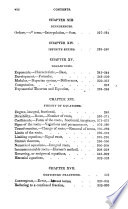 | Warren Colburn - 1844 - 280 páginas
...given to n. Let I be the term required, then l = a + (n— \)r. Hence, any term may be found by adding the product of the common difference by the number of terms less one, to the first term. • , Example. What is the 10th term of the series 3, 5, 7, 9, &c. In this a = 3,... | |
 | Charles Davies - 1845 - 382 páginas
...in its arithmetical sense. If we resume the formula we have, / = a + (n - 1) d, o= I — (n — l)d; that is, The first term of an increasing arithmetical progression, is equal to any following term, minus the product of the common difference by the number of preceding terms. From... | |
 | Charles Davies - 1848 - 300 páginas
...know the value of S in terms of a, n, and r. From the formula i=a+(nl)r, we find a=l — (n — l)r. That is : The first term of an increasing arithmetical...terms less one. From the same formula, we also find _l-a That is : In any arithmetical progression, the common difference is equal to the difference between... | |
 | 1848 - 394 páginas
...arithmetical sense. If \ve resume the formula we have, i = a + (n — 1) d, a = I — (n — 1 ) d ; that is, The first term of an increasing arithmetical progression, is equal ta any following term, minus the product of the common difference by the number of preceding terms.... | |
 | Stephen Chase - 1849 - 348 páginas
.../; whence, obviously, Z=a-|-(n — 1)Z>. (1) That is, The last term is equal to the first term, plus the product of the common difference by the number of terms less one. NOTE. Of course, the common difference must be taken positive or negative, according aa the series... | |
 | Charles Davies - 1851 - 300 páginas
...know the value of S in terms of a, n, and t From the formula l=a+(nl)r, we find a=/— (n — l)r. That is : The first term of an increasing arithmetical...terms less one. From the same formula, we also find la ' That is : In any arithmetical progression, the common difference is equal to the difference between... | |
 | John Bonnycastle - 1851 - 288 páginas
...X (a + 2d). 5. The last term of any increasing arithmetical series is equal to the first term plus the product of the common difference by the number of terms less one ; and if the series be decreasing, it will be equal to the first term minus that product. Thus, the... | |
 | Elias Loomis - 1856 - 280 páginas
...If we take the equation l=a+(n— 1)d, and transpose the term (n—1)d, we obtain a=l— (n— I)d; that is, the first term of an increasing arithmetical progression is equal to the last term, minus the prod' net of the common difference by the number of terms less one. (205.) If we transpose the term... | |
 | Charles Davies - 1857 - 408 páginas
...gives rise to the ten following cases ; — 177. From the formula we have, a = I — (n — 1) d ; that is, The first term of an increasing arithmetical progression, is equal to any following term, minus the product of the common di/erenct by the number of preceding terms. 178.... | |
 | Charles Davies - 1859 - 324 páginas
...in terms of a, n, and l. From th e formula, l = a + (n - \)d, we find, a = l — (n — \)d. Phât is : The first term of an increasing arithmetical...progression is equal to the last term, minus the product of tJu-. common difference by the number of terms less one. From the same formula, we also find, I - a... | |
| |